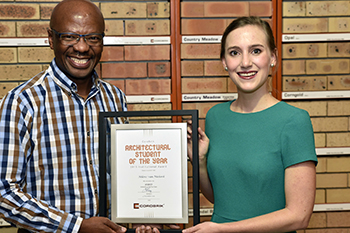Latest News Archive
Please select Category, Year, and then Month to display items
19 November 2018
|
Story Charlene Stanley
|
Photo Charlene Stanley
 Prof John Mubangizi, Dean of the Faculty of Law, encouraged delegates at the Fifth Annual International Mercantile Conference to share ideas on best international practice in their various fields.
Prof John Mubangizi, Dean of the Faculty of Law, encouraged delegates at the Fifth Annual International Mercantile Conference to share ideas on best international practice in their various fields.
“Don’t say anything online that you wouldn’t want plastered on a billboard with your face on it.”
This famous quote by international tech expert Erin Bury should be a guiding light when it comes to online habits in the workplace, according to Francois Cilliers, UFS Lecturer in Mercantile Law.
In his presentation Could Social Media be the Gateway to Employment Discrimination? he warned that employees have a responsibility not to bring their employers in disrepute through their comments on social media.
“Posts, updates, tweets, and comments are considered to be publications and can therefore never be seen as privileged information,” he explained.
Responsibility on employees and employers alike
He pointed out that employers also had a responsibility regarding the way in which they use the information about prospective employees obtained via social media.
“Nowadays, approximately 75% of companies hire through social media. In the US, recruiting companies spend hours researching candidates, making full use of what they can find on social media. It was found that 50–80% of employers frowned upon posts and pictures featuring drug and alcohol abuse, profanity, and bad grammar.”
He warned that employers needed to tread lightly, as a decision not to employ someone as a result of information on the prospective employee’s political views and sexual orientation could constitute unfair discrimination as set out in the Employment Equity Act.
“An employer who wishes to use a screening process (utilising social media) has to prove that the information and the process is objectively necessary and can be justified with reference to the inherent requirements of the job,” he explained.
“As technology and electronic systems advance, so too should the applicable labour laws.”
Cilliers’ presentation formed part of the Fifth Annual International Mercantile Law Conference recently hosted by the Faculty of Law on the Bloemfontein Campus.
Incorporating new technology in teaching and research
“This conference is an opportunity to share ideas on best practice in what is perceived as a ‘difficult’ field within Law,” said Prof John Mubangizi, Dean of the Faculty of Law, as he opened the proceedings. Topics in the discussion sessions ranged from Racism in the workplace and The underrepresentation of females in the judiciary, to Decriminalisation of cannabis: A recipe for healthy employer-employee relations?
“Conferences such as these help us to take advantage of the newest developments in technology to advance our teaching and research,” said Prof Mubangizi.
“To quote Einstein: ‘We can’t solve problems by using the same kind of thinking we used when we created them.’”
Regional winner designing her way to Architectural Student of the Year Award
2016-03-09

Musa Shangase, Corobrik Commercial and Marketing Director, and Nilene van Niekerk. |
For 29 years, Corobrik has been celebrating the most outstanding architectural talent in South Africa. This year, Nilene van Niekerk – a master’s graduate of the University of the Free State (UFS) Department of Architecture – features as one of the regional winners.
Deciding on a dissertation topic, Nilene contemplated how she could use architecture as a tool to address a non-architectural contemporary problem specific to post-apartheid democratic South Africa. Her answer was born from her passion for freedom of speech. “Freedom of speech and the intimidation of journalists by the controversial Secrecy Bill were at the forefront these past few years,” Nilene says. “Although freedom of expression are generally protected practices in South Africa’s constitution, the persistent role of the government to protect state information is a substantial threat to citizens’ constitutional right of freedom of expression.”
This resulted in Nilene’s dissertation topic, Freedom of Expression Forum. This architectural concept envision a building, in the vicinity of Constitutional Hill, that symbolises protest against the Secrecy Bill. The building will provide “protection to journalists and become a pivotal point where classified information can be sent and archived. It will also establish a public space that encourages communication – all in the name of fostering the right of freedom of expression within this human rights precinct,” Nilene says.
Nilene will now go on to compete for the national title at the Corobrik Student Architect of the Year Awards in Johannesburg in May 2016.
“The project also rethinks the idea of sustainability as it focuses on how to contribute to a sustainable political future in South Africa. I believe that we as architects, especially in a third world country, should think beyond the normative boundaries of sustainability,” Nilene says.